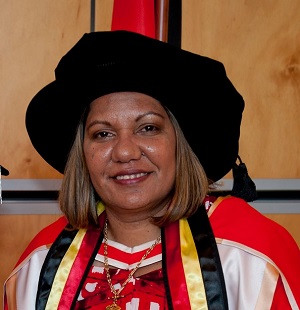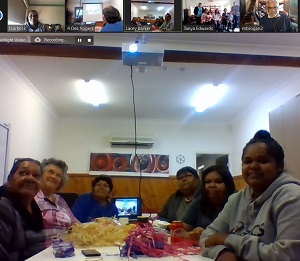Lorina Barker
BOOKS were treasured items when Lorina Barker was growing up in an Aboriginal community on a shee p station out the back of Bourke: “Our house was always surrounded with them.”
p station out the back of Bourke: “Our house was always surrounded with them.”
“They spilled over from every table, chair and cupboard; they were everywhere, and I read the ones my parents permitted me to read,” she says.
“Books were valuable, so they circulated around the community. Comic books - Conan the Barbarian, Archie and Footrot Flats - Mills & Boon, and westerns; that was the literature that my community all grew up reading.”
But it was a book she couldn’t read that set her on the path to becoming a storyteller herself.
‘The Two Worlds of Jimmie Barker: The Life of an Australian Aboriginal’ was a school English text to some, but much more to Lorina and her family.
It was the story of her great-grandfather, who had died the year before she was born - but not before recording 110 tapes of Muruwari culture, language and history, later edited into this autobiography.
“I was too young to read, but I was fascinated with the pictures,” Dr Barker says.
“That always stuck with me and was one of the reasons I also wanted to be able to tell our stories.
“I would see, growing up in western NSW, that our story wasn’t reflected that much in the literature, on TV, in famous paintings.
“Like: there was always the portrait of our Queen in public schools, and the Tom Roberts piece, ‘The Golden Fleece’. I’d sit in the library looking at that image and wondering why there were no Aboriginal people in there - because I grew up on what was then a sheep station on Muruwari Country, and my family worked on it as shearers, station hands, rouseabouts, crutchers and shearers’ cooks.”
***
Young Lorina, from the Wangkumara and Muruwari people, grew up at Weilmoringle north-east of Bourke and finished high school at Bourke.
Although she didn’t think she was “brainy enough” to go to university, her parents encouraged her to continue her education.
“I just filled the forms out because all the other students in the class were filling them out. I didn’t think I’d get accepted, but Mum’s attitude was, ‘Just give it a go. If you get in, you get in, that’s good’.”
The teenage Lorina wanted to do a Bachelor of Teaching but filled in the wrong course codes and was accepted into a Bachelor of Arts.
“Being a naive little country girl from remote NSW, I remember being pretty anxious and a bit distraught that I was in the wrong course - ‘It’s a Bachelor of Arts, I’m not an artist, I want to do teaching!’
“They explained to me that you can always change in your first year based on your results.”
She enjoyed and stuck with the BA, and backed it up with a Master of Letters before gaining a Graduate Diploma in Education.
Work in admin and student support at UNE’s Oorala Aboriginal Centre followed, then in 2004 a lecturing position.
***
Now, Dr Barker pursues her passion for stories through her research in local community and oral history, and enables it in others as a senior lecturer in UNE’s School of Humanities, Arts, and Social Sciences.
“It’s the research where I’m able to give voice to the Aboriginal spirit, stories and experience from the communities in which I work, and able to express our cultural knowledge and history in a way that is accessible to our community members and comes directly from them as well,” she says.
She was conferred her PhD in late 2014, after completing a thesis on community history and oral traditions, titled ‘Ngarraka Yaan: A Murdi History of Weilmoringle’.
Since then, she has led and participated in a variety of work to empower Aboriginal communities to tell their stories in their own ways.
‘Looking Through Windows’ was the culmination of a ARC research and community arts and language project about removal, dispossession and “protection” under the NSW Aborigines Protection Act.
It was a multimedia exhibition at New England Regional Art Museum (NERAM) in 2017, the Brewarrina Visitor Information & Exhibition Centre in 2018, and at 107 Gallery Redfern in 2018.
Her most recent large-scale project aims to track three Aboriginal Songlines - Baiame, the Mundaguddah and the Seven Sisters, from the Ikara-Flinders Rangers in South Australia to the Corner Country, up to the Cooper in south-west Queensland and then to the Baaka (Darling River) and Barwon Rivers in north-west NSW, to document their place in cultural knowledge, history, language, and identity.
With that physical work on hold due to COVID travel bans and concerns for remote communities’ health, Dr Barker and community stakeholders have instead gone online.
‘Yarning Online, On Country’ invites Elders to join a safe cultural space on Zoom, to create and share weaving, stories, photos, film and even cooking.
“We wanted to alleviate the isolation and stress of Elders in the community, for their cultural, social and emotional wellbeing,” Dr Barker says.
****
As someone who has made a life out of telling stories - and they are not simply stories, she explains: “They are much more, these stories are our Aboriginal history, knowledge and culture” - Dr Barker has a deep appreciation of people who share theirs.
Trust is a vital factor. “The kinship, the relationship community members have with each other is a way of being introduced to others. They don’t necessarily know who I am, but they know my grandparents and parents. It puts them at ease and they know how to relate to me as well … what stories they will want to share with me.”
But cultural sensitivity trumps the innate curiosity of this storyteller.
Despite having written her thesis on them and the book that followed, Dr Barker has never accessed her great-grandfather’s 110 tapes. Snippets of his voices, knowledge, stories, and experiences were filtered through the colonial lens of other people’s research.
Due to cultural protocols, she will have to gain the permission of the Elders who are custodians of that knowledge.
And she says that’s the way it should be.
“Certain stories are told to you depending on who you are, depending on the people who might be in the same room or around the same campfire,” Dr Barker says.
“No story is ever told in the same way: it’s not as animated as it might have been and certain parts might be left out because that person has passed away and that was the part they told.
“Stories come to you at certain times of your life, depending on who you are and your relationship with that individual ...
“You’re not meant to know everything.”

Lorina with family and cast members of ‘Trucked-Off’ at a UNE Elders Gathering in 2018. Back: Gordon Cope, Craig Hearps, Julie L Collins, Karin von Strokirch, Lorina Barker, Gwen Barker, Lacey Barker, Garry Slocombe. Seated: Judy McBain, Jamira Shillingsworth, Peta Barker, Kimberley Barker, and Svea the border collie.
 Participants of Yarning Online, On Country
Participants of Yarning Online, On Country

